Mandela’s ‘unhelpful’ mediation over Lockerbie bombing
Libya’s Colonel Muammar Gaddafi wanted the former South African president to persuade Tony Blair to lift sanctions on his country

Your support helps us to tell the story
From reproductive rights to climate change to Big Tech, The Independent is on the ground when the story is developing. Whether it's investigating the financials of Elon Musk's pro-Trump PAC or producing our latest documentary, 'The A Word', which shines a light on the American women fighting for reproductive rights, we know how important it is to parse out the facts from the messaging.
At such a critical moment in US history, we need reporters on the ground. Your donation allows us to keep sending journalists to speak to both sides of the story.
The Independent is trusted by Americans across the entire political spectrum. And unlike many other quality news outlets, we choose not to lock Americans out of our reporting and analysis with paywalls. We believe quality journalism should be available to everyone, paid for by those who can afford it.
Your support makes all the difference.Nelson Mandela’s attempts to act as an intermediary over the Lockerbie bombing led to friction with Tony Blair’s Labour government, according to newly-released official documents.
Files released to the National Archives at Kew, west London, showed officials in No 10 feared the former South African president’s efforts to act as a go between with the Libyan leader Colonel Muammar Gaddafi were “unlikely to be helpful”.
As president, Mr Mandela helped broker the agreement which eventually led to two Libyan intelligence agents standing trial before a Scottish court sitting in the Netherlands for the bombing of Pan Am Flight 103 over the Scottish village of Lockerbie, killing 270.
But after one of the accused, Abdelbaset al-Megrahi, was found guilty in January 2001 – 13 years after the attack – Mr Mandela, by now out of office, sought to intercede again as Gaddafi pressed for international sanctions against his country to be lifted.
In March 2001, Mr Mandela telephoned Mr Blair to tell him Gaddafi had asked him to negotiate with him on his behalf.
Anna Wechsberg in the No 10 private office noted: “Mandela evidently sees himself acting as mediator between the prime minister and Gaddafi. This is unlikely to be helpful.”
Mark Sedwill in the Foreign Office was also alarmed, writing: “Mandela does not accept our position that Libya must meet the requirements of the (United Nations) Security Council resolutions before sanctions are lifted.
“He believes vehemently that we have reneged on our promises. Mandela is, at best, suffering from selective memory and a basic misunderstanding of international law.
“It is likely that Mandela is confusing the proposals he made with the undertakings we gave. It is also likely that he promised Libya more than we agreed.”
Despite the misgivings of his aides, Mr Blair agreed to meet the former president in No 10 the following month to discuss the issue.
According to the official note of their conversation, Mr Mandela was highly critical of the court ruling and insisted Libya could not be held legally responsible for the bombing.
He suggested while Gaddafi may be prepared to pay compensation if al-Megrahi lost his appeal against conviction (as was the case), this should been seen “as voluntary, and the payments ex gratia, and not because he was legally bound to do so”.
The note went on: “Gaddafi wanted to clear his image. While Gaddafi was a very difficult man, he, Mandela, trusted him to fulfil the commitments he made.
“But if we now insisted that he was accountable in law for Lockerbie he would challenge that, and Mandela said he would back him up.”
Afterwards there was some relief among Mr Blair’s team that the meeting had not gone as badly as feared, and could potentially even be turned to the UK’s advantage.
Jonn Sawers, Mr Blair’s foreign policy adviser, wrote: “Mandela’s presentation was a mixture of intricate legal points and special pleading.
“But he did not repeat his accusations that we had gone back on an agreement made earlier, nor did he contest the need to pay compensation.
“The next stage is to engage with Libyans authorised to deal with us, and draw up reasonable proposals. We might even be able to use Mandela back against Gaddafi if the Libyans reject a reasonable offer.”